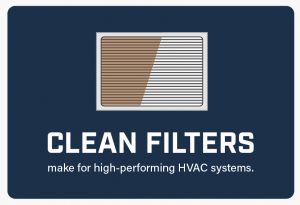
Whether you are a Beaverton business owner or a Portland homeowner, you know that your heating and cooling unit is intricate and complex. However, you might not know the vital role furnace and air conditioning filters play in your overall indoor air climate. If you’ve ever asked yourself, “Does my furnace have a filter,” or “Why are filters crucial to HVAC performance,” then it’s time to learn more about the inner workings of your commercial and residential AC and heating units.
Are Furnace Filters the Same as Air Conditioning Filters?
While some people might refer to cooling and heating filters as if they are different, our Oregon HVAC installers are here to tell you both your furnace and air conditioning filters are, in fact, the same. What does that mean for your commercial or residential property? Since both components of your heating and cooling system use a single, shared filter, you don’t have to worry about purchasing multiple ones or adding more to your routine maintenance.
5 Filter Facts for Businesses and Households
Now that you understand air conditioning and furnaces filters are the same, you might have lingering questions about general filter facts. Our NATE-Certified professionals have compiled all the must-know info:
1. All Central Heating and Cooling Systems Have Filters
Whether your HVAC unit is designed for commercial use or for residential, all central air systems should have a filter. While some can be more challenging to locate than others, filters are commonly found between the return air duct and the central unit.
2. Filters Regulate Indoor Air Quality
Filters are designed to catch dirt, debris, pollen, and other contaminants before they can be circulated throughout your home. Not only does this go a long way to maintaining healthy indoor air quality, but it can also help prevent sick building syndrome and aid allergy sufferers in commercial settings.
3. Air Filtration Requires Regular Maintenance:
Because your furnace and air conditioning filters are responsible for trapping particles and dust, the filters can become clogged and dirty over time. Gunky air filters can not only decrease your indoor air quality, but they can put unnecessary strain on your whole HVAC system, leading to potentially costly repairs. Our heating and cooling installers in Beaverton and Portland recommended changing most filters every three months to ensure optimum performance.
4. Well Maintained Filters Save on Energy Costs
 Clean filters make for high-performing HVAC systems. The more efficiently your air conditioning and furnaces systems run, the less energy your system has to output. This translates to better energy costs overall.
Clean filters make for high-performing HVAC systems. The more efficiently your air conditioning and furnaces systems run, the less energy your system has to output. This translates to better energy costs overall.
5. Filters Come in All Shapes and Sizes
Furnace and air conditioning filters need to fit the HVAC system and work with the unique demands of your desired air climate. Our residential and commercial heating and air conditioning specialists recommend thinking about the following when buying or replacing your filter:
- Size: The filter should be large enough to trap all the particles.
- Thickness: Thicker filters will last longer; however, it’s essential to ensure they aren’t too bulky for the filter cabinet.
- Type: Filters come in pleated and non-pleated varieties. Pleated types tend to last longer, and their design helps to increase surface area.
- Efficiency: Filters often come with a MERV rating. The higher the rating means, the better the filter is as catching minute particulates
When to Call Your Local Heating and Furnace Repair Services
If you have any questions about filter replacement, furnace repair, or air conditioning services, our team at AAA Heating and Cooling is here to help! We are your go-to HVAC company with locations in Beaverton and Portland and 60 years of commercial and residential experience. Contact us today!